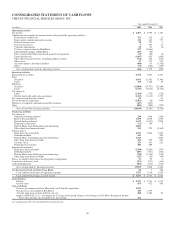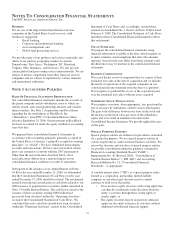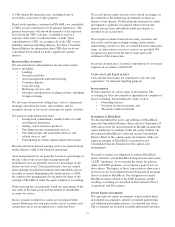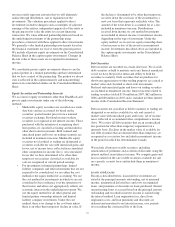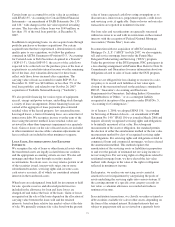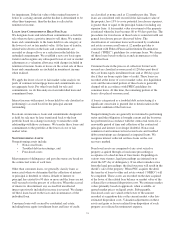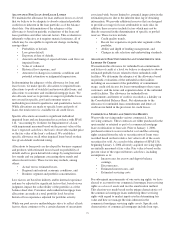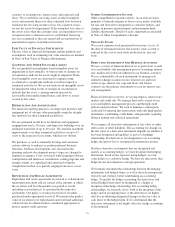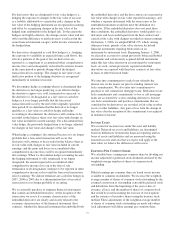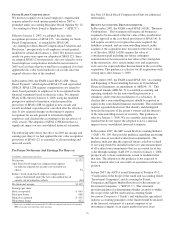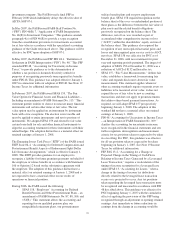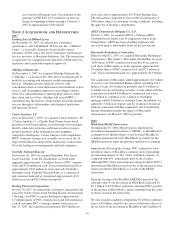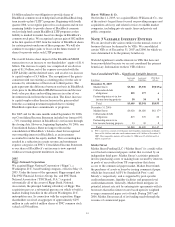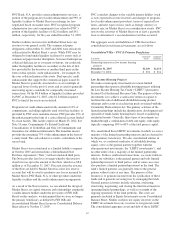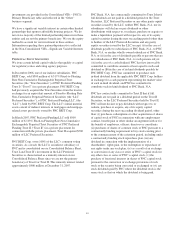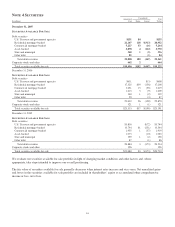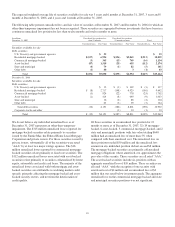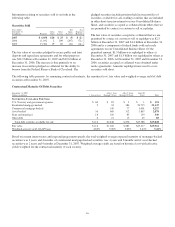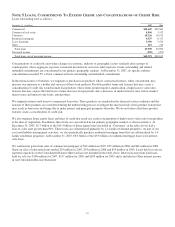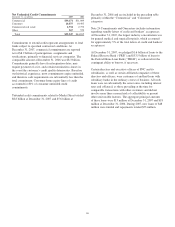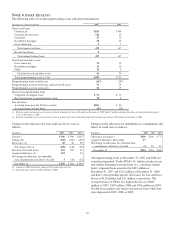PNC Bank 2007 Annual Report Download - page 84
Download and view the complete annual report
Please find page 84 of the 2007 PNC Bank annual report below. You can navigate through the pages in the report by either clicking on the pages listed below, or by using the keyword search tool below to find specific information within the annual report.investment company. The FASB issued a final FSP in
February 2008 which indefinitely delays the effective date of
AICPA SOP 07-1.
In May 2007, the FASB issued FASB Staff Position No.
(“FSP”) FIN 46(R) 7, “Application of FASB Interpretation
No. 46(R) to Investment Companies.” This guidance amends
paragraph 4(e) of FIN 46(R) to provide a scope exception
from the consolidation provisions for investments accounted
for at fair value in accordance with the specialized accounting
guidance of the Guide referenced above. This guidance will be
effective for PNC upon adoption of SOP 07-1.
In May 2007, the FASB issued FSP FIN 48-1, “Definition of
Settlement in FASB Interpretation (“FIN”) No. 48.” This FSP
amended FIN 48, “Accounting for Uncertainty in Income
Taxes,” to provide guidance as to the determination of
whether a tax position is deemed effectively settled for
purposes of recognizing previously unrecognized tax benefits
under FIN 48. This guidance was adopted effective January 1,
2007 in connection with our adoption of FIN 48. See Note 19
Income Taxes for additional information.
In February 2007, the FASB issued SFAS 159, “The Fair
Value Option for Financial Assets and Financial Liabilities –
Including an amendment of FASB Statement No. 115.” This
statement permits entities to choose to measure many financial
instruments and certain other items at fair value. The fair
value option may be applied on an instrument by instrument
basis with a few exceptions. The election is irrevocable and
must be applied to entire instruments and not to portions of
instruments. We adopted SFAS 159 and elected to fair value
certain loans held for sale and other financial instruments to
align the accounting treatment for these instruments with their
related hedges. The adoption did not have a material effect on
retained earnings at January 1, 2008.
The Emerging Issues Task Force (“EITF”) of the FASB issued
EITF Issue 06-4, “Accounting for Deferred Compensation and
Postretirement Benefit Aspects of Endorsement Split-Dollar
Life Insurance Arrangements,” which is effective January 1,
2008. This EITF provides guidance for an employer to
recognize a liability for future premium payments on behalf of
the employee or retiree benefits in accordance with Statement
106 or Opinion 12 based on the substantive agreement with
the employee. The adoption of this guidance did not have a
material effect on retained earnings at January 1, 2008 and is
not expected to have a material effect on our results of
operations or financial position.
During 2006, the FASB issued the following:
• SFAS 158, “Employers’ Accounting for Defined
Benefit Pension and Other Postretirement Plans – an
amendment of FASB Statements No. 87, 88, 106, and
132(R).” This statement affects the accounting and
reporting for our qualified pension plan, our
nonqualified retirement plans, our postretirement
welfare benefit plans and our post employment
benefit plan. SFAS 158 required recognition on the
balance sheet of the over- or underfunded position of
these plans as the difference between the fair value of
plan assets and the related benefit obligations
previously recognized on the balance sheet. The
difference, net of tax, was recorded as part of
accumulated other comprehensive income or loss
(“AOCI”) within the shareholders’ equity section of
the balance sheet. This guidance also required the
recognition of any unrecognized actuarial gains and
losses and unrecognized prior service costs to AOCI,
net of tax. SFAS 158 was effective for PNC as of
December 31, 2006, with no restatement for prior
year-end reporting periods permitted. The impact of
adoption of SFAS 158 at December 31, 2006 was a
reduction of AOCI of $132 million after tax.
• SFAS 157, “Fair Value Measurements,” defines fair
value, establishes a framework for measuring fair
value, and expands disclosures about fair value
measurements. This statement applies whenever
other accounting standards require or permit assets or
liabilities to be measured at fair value; it does not
expand the use of fair value to new accounting
transactions and does not apply to pronouncements
that address share-based payment transactions. As
required, we will adopt SFAS 157 prospectively
beginning January 1, 2008. The adoption of this
standard did not have a material effect on retained
earnings at January 1, 2008.
• FIN 48 “Accounting for Uncertainty in Income Taxes
– an Interpretation of FASB Statement No. 109,”
clarifies the accounting for uncertainty in income
taxes recognized in the financial statements and sets
forth recognition, derecognition and measurement
criteria for tax positions taken or expected to be taken
in a tax filing. For PNC, this guidance was effective
for all tax positions taken or expected to be taken
beginning on January 1, 2007. See Note 19 Income
Taxes for additional information.
• FSP FAS 13-2, “Accounting for a Change or
Projected Change in the Timing of Cash Flows
Relating to Income Taxes Generated by a Leveraged
Lease Transaction,” requires a recalculation of the
timing of income recognition for a leveraged lease
under SFAS 13, “Accounting for Leases,” when a
change in the timing of income tax deductions
directly related to the leveraged lease transaction
occurs or is projected to occur. Any tax positions
taken regarding the leveraged lease transaction must
be recognized and measured in accordance with FIN
48 described above. This guidance was effective for
PNC beginning January 1, 2007 with the cumulative
effect of applying the provisions of this FSP being
recognized through an adjustment to opening retained
earnings. Any immediate or future reductions in
earnings from the change in accounting would be
79


